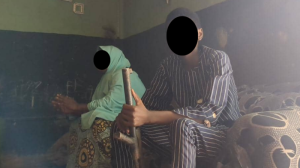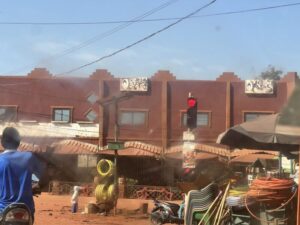By Kayode Adegboyega Taiwo
Satellite Times online newspaper last week opened a new chapter in corruption reporting in Nigeria by inducting five mid-level private sector practitioners into newsroom freelance reporting. The five – three males and two females – were part of a total of 19 journalists that participated in a 2-day media training workshop held 30th and 31st May at the All Saints House, Wuse Zone 3 Abuja.
The capacity-building workshop with title: “How To Read Company Documents” was held under the Collaborative Media Engagement for Development, Inclusivity and Accountability Project, an initiative of the Wole Soyinka Centre for Investigative Journalism (WSCIJ), funded by the MacArthur Foundation. The Collaborative Media Engagement is aimed to strengthen media independence and presence, especially at state and local government levels and the private sector, in a bid to improve public awareness and the ecosystem for transparency, accountability and good governance.
In his opening remark Emmanuel Mayah – multiple award-winning journalist and Executive Director of International Centre for Development Reporting (ICDR), the publishers of Satellite Times – said that over the decades, investigative journalism had focused almost entirely on government actors and agencies and Politically Exposed Persons (PEPs), but barely a glance is given to the private sector where over 80% of corruption in Nigeria is hosted.
He said: “For too long the private sector has escaped the critical scrutiny of the media. Firstly the private sector must be recognized as a key partner for the development of any nation. We are not here to demonize corporate entities; however, to achieve good governance in Nigeria we must pay deliberate attention to identifying and bringing to citizens attention those private sector actors whose stock in trade is sabotaging every fiscal policy in Nigeria through rent seeking, trade malpractices, tax credit fraud and sundry convoluted schemes, all of mindboggling scale, leading to huge losses in government revenues. FIRS figures in 2019 for example show that Nigeria on an annual basis loses over six trillion naira to tax avoidance alone, one of the numerous schemes employed mostly by multinationals to undermine the Nigerian economy.”
Introducing the five private sector practitioners, Mr. Mayah said that the workshop doubled as an immersion programme for the non-journalists while serving as a mentoring programme for newsroom practitioners.
He said: “We must make this important intersection. The whole idea is aimed at strengthening collaboration and ultimately the fight against corruption. Some of our friends here have worked with me before as members of a whistleblowing network. But we want more. I am hoping that their physical presence in our team will shorten the learning curve for journalists here eager to have more than a textbook grasp of the workings and dynamics of the corporate sector.
“The whole idea too is to transition journalists from reporting corruption in the public sector to investigating corruption in the private sector, an opaque ecosystem with a higher index of corruption and commercial malpractices than in the government circle. Lastly, I am also hoping to transition whistleblowers from being mere bell ringers to becoming what I would call special reporters, who in the course of their daily work in their different sub-sectors in the corporate world would begin to see and hear things with the eyes and ears of a journalist.”
Sample company documents analysed during the 2-day workshop included those drawn from the shipping sector, banking, insurance, the money market, commodity trading companies, aviation and seaport terminal operations. Maritme trade expert Francis Ikechukwu Obiajuru left participants in awe with his insight on cloning of shipping documents, particularly the cloning of Form M. He also availed the journalists with links to important trade databases across the world.
A second resource person, Peter Kwayindagami, is a former banker who showed with documents how commercial banks aid corporate clients to carry out financial crimes and trade malpractices. He added that accounting firms, “including the so-called Big 4” are sometimes part of the corruption loop in the private sector.
Emmanuel Mayah seized the occasion to introduce Business Leaks (www.businessleaksng.com) a sister publication of Satellite Times which he said was dedicated to business investigation. Participants included journalists from Satellite Times and reporters from external newsrooms in Abuja.



